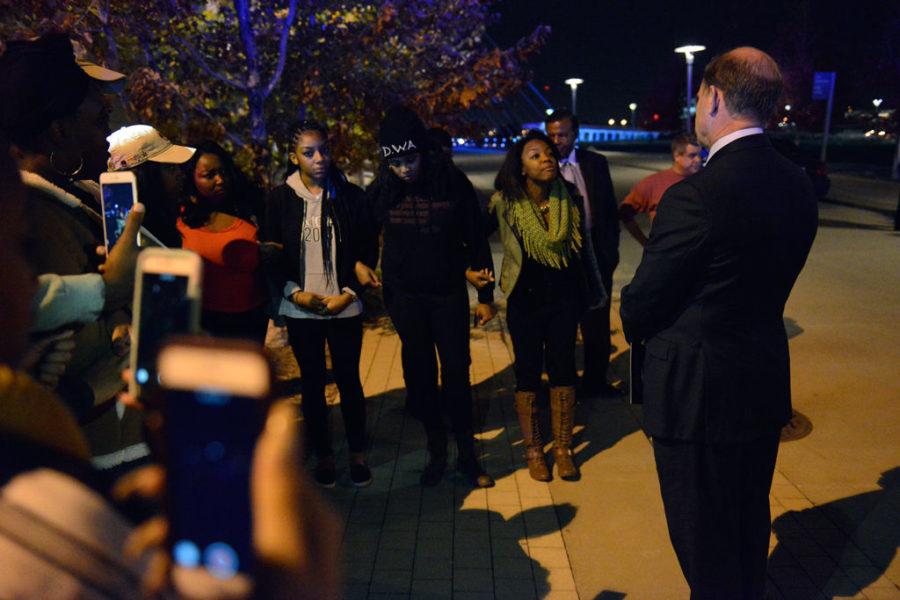Racial tension boils over on college campuses nationwide
Courtesy of Justin L. Stewart/Missourian
Students from the Concerned Student 1950 group record video on their smartphones as they confront UM System President Tim Wolfe outside of the Kauffman Center in Kansas City, Mo., Friday night, Nov. 6, 2015.
November 9, 2015
What students, faculty and football players did to protest racially-charged events and comments at the University of Missouri is an act ISU senior Markus Flynn would call “revolutionary.”
Tension on university campuses across the country boiled over in recent weeks as students and faculty have protested university responses, or the lack thereof, to racial tensions on their campuses, causing multiple administrative resignations and garnering national media attention.
Though the most recent events at the University of Missouri, Yale University and Ithaca College — each institution seeing its students call for administrative resignation due to a lack of response to minority student concerns — have come to light this fall semester, the feeling of oppression minority students have has been present for years, said Flynn, who is president of the Black Student Alliance.
“I think that shows you how deeply ingrained that issue was, that that many people felt it was necessary [to take action],” Flynn said about the joint efforts between the faculty, students and athletes at the University of Missouri prior to the resignation of its president and chancellor. “There are racial instances on any college campus.”
Iowa State is not immune to these issues and is also in the midst of a minority student-led call for action.
“[Iowa State’s] just didn’t manifest the same way [as Mizzou’s],” Flynn said. “We have our own form; we deal with micro-aggressions every single day.”
At Mizzou, students, faculty and athletes joined in protest against the university’s president Tim Wolfe and Chancellor R. Bowen Loftin, who both resigned Monday due to their lack of response to multiple events on campus, including racial slurs and a swastika painted in human feces on a dorm wall.
Wolfe was also criticized for his definition of systematic oppression, saying it was “when you don’t feel you have an equal opportunity,” to a group of black students who asked what he thought the phrase meant.
At Yale University, students are calling for the resignation of Master of Silliman College Nicholas Christakis and Associate Master Erika Christakis over Erika Christakis’ response to an email sent out by the university cautioning students to be mindful when selecting Halloween costumes.
At Ithaca College, students issued a vote of no confidence in the college’s president because of what some students say are inadequate responses to multiple allegedly racist events on campus, including a racially-charged party invitation to a fraternity party as well as training session incidents.
At Iowa State, a group of students demanded administrative action regarding longstanding multicultural issues on campus that have been bubbling up this semester after the ripping of a protester’s poster at the Sept. 12 CyHawk football game.
“Our university reacted, and it’s not like this semester is so much different than it has been in the past,” Flynn said. “It’s just this semester students really had an action behind it. The action really garnered a response.”
The group Latinos United for a Change, formerly known as Students Against Bigotry, along with Student Government held an open forum Sept. 30 to address their concerns and share personal stories with ISU President Steven Leath, Dean of Students Pamela Anthony and Senior Vice President for Student Affairs Tom Hill.
The panel, made of students from numerous multicultural organizations, shared with the administration suggestions on how to improve the climate around campus. Administration received a list of demands and recommendations the first week of October.
“Since that time, we have been working to assemble some information related to the recommendations,” Hill said. “Right now we are pretty close to putting some things together that we will hopefully have an opportunity to reach out to [Latinos United for a Change] again and have a follow up conversation so we’re all on the same page.”
Hill said he couldn’t give specific examples about what the list entails until he and other campus leaders meet with Latinos United for a Change and agree on the top priorities and discuss a strategy to implement change.
The meeting will hopefully happen before the end of this semester, Hill said.
Flynn, a senior in kinesiology and health, said the biggest change he’s noticed since the open forum is a shift of people’s train of thought: the issues are closer to the front of their minds.
To actually see a difference takes time, Hill said, but also stated that just because students don’t immediately see a difference doesn’t mean administration isn’t taking action.
“We’re not doing nothing,” Hill said. “We need to develop a strategy to set the priorities to accomplish other things.”
Iowa State announced mid-October the name of the university’s first vice president for diversity and inclusion, Reginald Stewart. John McCarroll, with university relations, said Reginald will need an adjustment period coming in to learn campus dynamics, but also said “some of these things take time. It doesn’t mean we’re not doing anything.”
Flynn said an actual attitude shift on campus takes more than a few policy changes.
“To see real change on this campus, it’s larger than any university,” Flynn said. “It goes back to systematic oppression. Racism falls on a spectrum and it aligns almost exactly with skin color.”
Flynn also said diversity training for university employees is pertinent and should have happened “long before this event,” adding that diversity includes more than culture.
“It’s not just people of color. It’s diversity in general. You can’t expect faculty and staff, regardless of background, to know how to react in certain situations if they don’t have the experience,” Flynn said. “After seeing the events, it showed me how serious and how deeply ingrained these issues were on campus.”
















